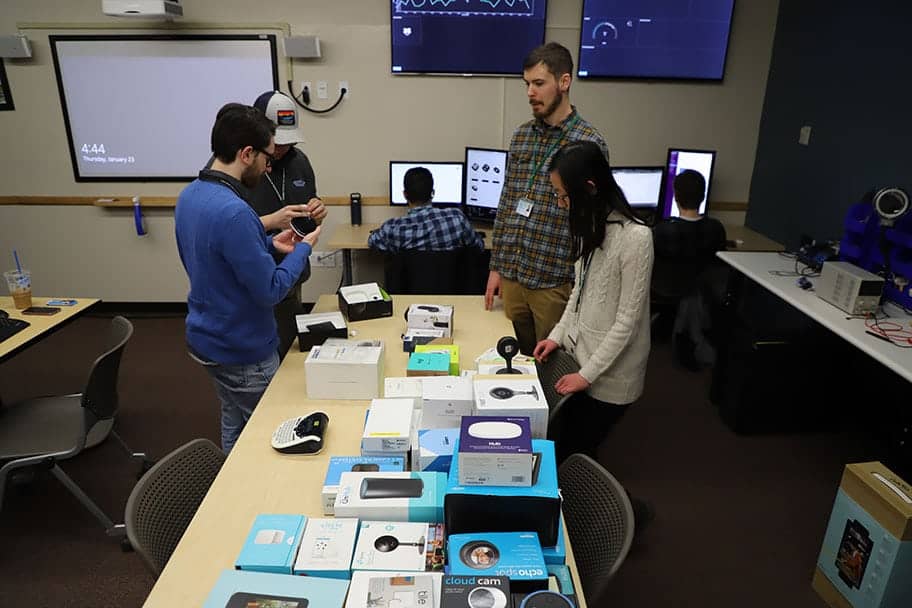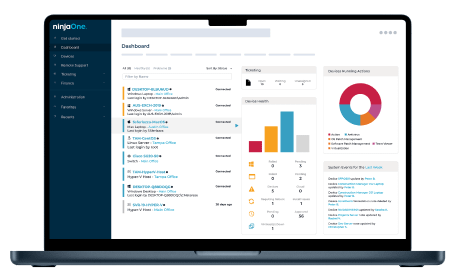The Leahy Center for Digital Forensics and Cybersecurity at Champlain College is a world-class laboratory with state-of-the-art technology, providing digital forensics and cybersecurity services to a wide variety of organizations, including government bodies, non-profits, and local businesses.
Leahy Center is first-and-foremost a place for the next generation of cybersecurity specialists and engineers to learn, grow, and prepare themselves for work in the field. The Leahy Center serves as a practical and hands-on laboratory environment for students, promoting the advancement of digital forensics and cybersecurity education at Champlain College and the community.
“The Leahy Center is an experiential hands-on learning environment,” says Joseph Williams, the Managing Director of the Leahy Center at Champlain College. “We have a very competitive internship program conducting research on cybersecurity and digital forensics and providing hands-on training to prepare our students for the workforce.” In addition to their research, students at the Leahy Center progress through training as helpdesk technicians while supporting local business. They start as level one help desk technicians focused on hands-on support and remediation. When they progress to level two, they’re given more tools to collect data, conduct forensics, and remediate issues. Finally, as systems administrators, they are given full access to the tools and data they need to remotely manage endpoints and remediate issues for clients and endpoints in the lab.

“We have 80 students per semester and 30 computers in the lab, so every one of those endpoints is getting used very heavily. With our students researching cybersecurity issues, you never know what’s going to end up on one of the lab computers,” says Joseph. Prior to Ninja, the Center’s student technicians would go computer-by-computer to do software inventories, check endpoint health, and remediate any issues. “We weren’t managing endpoints as well as we could before we got Ninja. Each computer was handled on a case-by-case basis for everything from removing unapproved software to diagnosing more complex issues” says Joseph.
“It’s really important that the students in my lab get real hands-on experience that they can apply after they graduate. To enrich our students’ experience and expand our outreach to the community, we need a solution that would help us provide effective remote support to our clients – that’s where Ninja comes in,” explains Joseph.
In addition to using Ninja’s built-in remote access tool to directly support partners, The Leahy Center also uses Ninja for security and forensics. Student technicians use Ninja heavily for software management – installing, uninstalling, and blacklisting applications. Ninja’s activity logs are imperative from a forensics perspective. A technician can easily identify which student last used a device and reach out to that student to understand the actions they were taking on an endpoint. “One example that comes to mind is when one of our endpoints crashed completely and we had to initiate a restore,” says Joseph, “One of my technicians looked up who had last used the device and had a conversation with the student – he was researching malware on the physical device, rather than spinning up a virtual machine.”
Patching laboratory computers with Ninja has been a huge improvement. “We used to delay major updates as long as possible because these endpoints are used so heavily. Now with Ninja we just send updates to happen outside of lab hours and they’re all patched automatically. No one needs to stay late and update them manually or wait until summer when the computers are utilized less,” explains Joseph.
As the student technicians progress in their program, they’re able to get more hands-on with Ninja. “Level one technicians do everything 100% hands on. I think its really great experience to send them on-site to clients to get their hands physically on the device and provide support. At level two, we give them read-only access to our production Ninja environment and allow them to write and deploy scripts in our test environment. At this point they’re seeing alerts in Ninja and triaging issues but need to go on site to actually provide support. In their third semester, they get full access to Ninja and can use the tool in its entirety to support our clients. Our students pick up Ninja really quickly, but we hold them back from using Ninja in its entirety so they can get hands-on experience addressing IT problems without a tool to make it easy for them,” says Joseph.
“NinjaOne helps us achieve our mission by allowing us to significantly expand our outreach to the community which gives our students more real-word experience in cybersecurity and digital forensics,” says Joseph. “We’re able to support more non-profit and small business clients more effectively than ever before. The research and real-world experience we give our students at the Champlain College Leahy Center for Cybersecurity and Digital Forensics prepares our students to excel in their field.”

